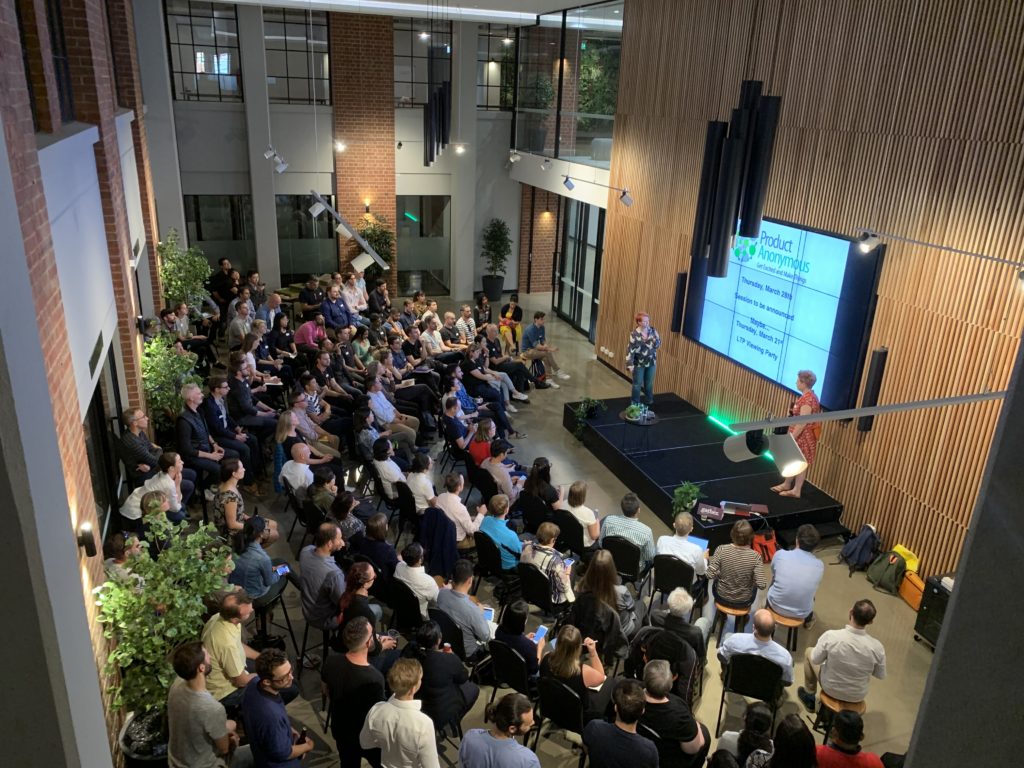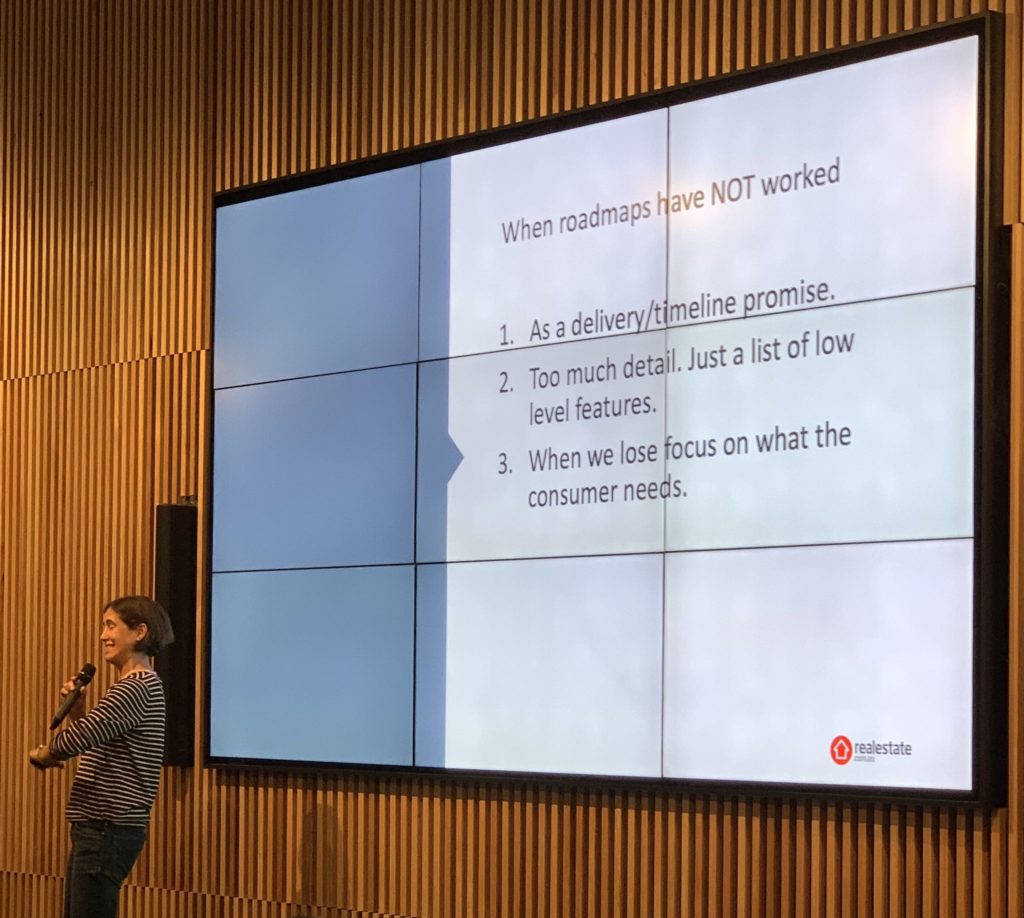We opened 2019 talking about roadmaps – a topic we had been asked in responses to our annual feedback to spend some more time on. We invited our speakers to share their different perspectives on roadmaps… and we heard come common themes to help understand how to keep a roadmap from controlling your life, and how to turn it into a fabulous communication and vision guide for inspiring your teams, plus some sage advice relevant to each organisation who took the stage that evening.

Below are some highlights from each talk plus the slides from each speaker – feel free to reach out to any of them if you would like to chat more. Plus we have added some references to other resources to read and explore at the end of this post.
David Bignall / Seek
David had much to share – ultimately not a fan but he did share some tips on how to help make them work for you rather than be a slave to them!
Roadmaps are a thing, every company has them so you will encounter them. David used this deck at Seek over a year ago to his team and people so proof they are a real thing, but after having the discussion has helped wean the team/group he is on off them.
For David when sharing what he thinks a roadmap is showed a map – because it is a journey to an unknown place.
“A document to capture and quickly convey a team’s big-picture goals, specific objectives and their imagined path to success” – Dave
“A company roadmap is a document to capture and quickly convey its big-picture plans and objectives” – prodplan.com
“The first purpose is because the management of a company wants to make sure that the teams are working on the highest value items first, relevant to the company strategy.
The second purpose is because businesses may have date-based commitments. The roadmap is where they see and track those commitments.” Marty Cagan, SVPG
They can be useful – but they can also be a big waste of time – common issues:
- Intended goals/purpose are not stated or are not clear
- Often far to specific
- You can’t have that much foresight 9 months away
- They do not account for “time to value”. Iteration is almost always needed to realise the full value of a new product/feature – (David bravely shared an own example of a very bad roadmap!)
- Put item on there and them immediately moving on to the next thing
- Ignoring the process of iteration or things going wrong
- Detail on roadmap can lead team to auto-pilot. They build what they put down on paper often months in advance
- Team goes into auto-pilot. As if this is their job, rather than thinking of most value to be delivered for the customer
- Distributed copies are out of date
- Keeping stakeholders up to date can drain your time. You don’t want to feel like you work for the roadmap, and it is just sucking your time from doing real work.
“Many untested hypotheses, based on assumptions, plotted in an uncertain future, bearing no resemblance to reality” Jared Spool
Dave’s top tips for roadmaps
- Show where you want to go
- Choose granularity relative to the timeframe and audience
- Avoid specificity (Show the problem or JTBD or objectives as descriptors of intent rather than the solution)
- Keep it simple, centralised and accessible
- Don’t work for it, it works for you.
Whitney Cali / realestate.com.au
Whitney opened with sharing a story about her experiences of not liking roadmaps because she has never seen a roadmap, become reality. She first got to know REA when working at a company in the US, and became a slave to the roadmap as they committed to work they would deliver to this customer. Then, she joined REA and was so excited about agile and thought, YES! I’ll get away from roadmaps! But she was fooling herself – see the beautiful roadmap on the wall at REA (pictured in slides). However, she soon found that REA was using roadmaps and needed to due to the big size of the organisation and the need to coordinate a lot across so many teams, groups etc.

However, in Whitney’s attempt to accept roadmaps and make peace with the need for them she started asking “Why do people ask for roadmaps?”.
Some of the things she learnt don’t work when using them:
- Don’t work as a promise
- Too much detail – just a list of lower level features
- Lose focus on what the customer needs.
REA owns a lot of companies and even just within Realestate.com a dozen delivery teams.
“Satisfaction is a confirmation or dis-confirmation of expectations.”
Example of people waiting for train for 15 minutes but dissatisfied, and others warned that train will come at 5:30 and apologies for the delay, did not rate their travel experience as dissatisfying as compared to the first group as their expectations were met/managed.
With that in mind let’s try to think what this artefact does to satisfy our leaders.
So what are they currently doing with Whitney’s team – they use a 90 day view – showing a commitment up to 90 days. No promises beyond that – great for delivery teams. Not great for stakeholders.
For stakeholders they use a Discovery backlog (second 90 days) and an Opportunity backlog (all the rest – no priority) – people now satisfied that their idea is on there – somewhere. Others groups understand that stuff that comes out of Discovery will most likely make it to the committed version and the conversation is being moved to a different stage of team flow.
I encourage you to seek to understand with genuine curiosity, the needs of anyone who has a problem and thinks that a roadmap is the solution. Whitney
Keith Swann / Origin Engery
Keith brought to us a more positive upside to the roadmap discussion
His beliefs are that they help with:
- Alignment – up or down
- Influence – rarely based on dollars
- Leadership – how do we inspire people and rally them to our cause
Alignment
- Everyone will scrutinize it to their own
beliefs, so do it carefully – target on your back
- Strategic – Financial, PMOs, GMs, etc. etc. interpret the stuff and then try to manage up and down.
- Cultural – make sure it talks to your audience
- Influence Record – Successful record of moving things along. Better record = less scrutiny
A road map is a Story telling device and the aspects Keith uses are MUM, Problems, Position, Opportunity, Value. How do you tell the story, “up or down” the organisation. Think of the “Cone of influence” – below people can make lots of small decision but not big decisions. As you move up you get spun out if you aren’t managing those stakeholders.
- Eisenhower: Plans are useless, but planning is indispensable
- Every day the plan can change – the second your plan is finished it is out of date.
- Roadmap = Vision.
Takeaways
- Don’t put in too much detail
- Think of your audience – Working Tested Feature – WTF
- Don’t muddle the Project Mindset – Delivery Planning – Bookending with a roadmap
- Don’t become vague in your horizon 2 and 3 – don’t over promise
- Make it easily editable and manageable
- Post Its on the wall and photos
- Over invested time of effort – working with visual designers. 5 days work and 6/7000$ and printed in colour. Thus, you deliver to the roadmap even though you don’t want it anymore because too much effort went into the artefact.
- Don’t clearly show values
- Don’t focus on the feature – focus on the problem or opportunity.
Summary
Roadmaps may very well be a necessary evil, especially in a big organisation when you have many teams and people to motivate, inspire and align. However, our speakers have shared some great tips to help keep you from being a slave to them as well. For some more references and reading on steering clear of them and/or leaning into making them work for you check out some of the links below:
- Brad Dunn has some opposing opinions on roadmaps.
- Marty Cagan is not a fan and in these post he links to OKR’s which came up in both the speaker presentations and the questions afterwards.
- And last but not least for a more practical tuition on taking back control of your roadmap you could check out Bruce McCarthy’s seminar on UIE
Thank you!!!
And thank you to our sponsors as always, without them these events do not happen.




